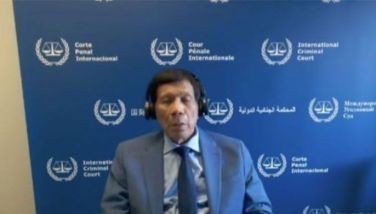Postscripts to SONA 2014
Picture it. You have a boyfriend who cheated on you, not once, but many, many times. He lies every time to cover his tracks. He lies to cover for his friends who are a bad influence.
So you decide it's not working and the better for you to part ways.
But then he wouldn't let you, because he insists he loves you and that he is a good person with the best of intentions (or so he claims). He knows you all too well, you're emotional and a hopeless romantic, a sucker for fairytales and happy endings.
And so he starts a speech to last well over an hour to profess his love and enumerate everything he's supposedly done for you, he appeals to your goodness, he cries, the works. He then resorts to good ol' emotional blackmail and threatens you with suicide (or the "I am terminally ill" excuse) if you ever break up with him.
What do you do? If you buy it, if you're moved by the tears and still decide to try to make it work — this despite all the lies and excuses, because he seems sincere, what does that make of you? Sinong gago?
Iniyakan ka lang, naniwala ka na? Dios mio.
#SONA2014
***
My Facebook post for the ultra-diehard Noynoy fans:
Let's talk about the issues, the personalities and convictions and reasons behind these issues, thresh them, scrutinize them, undress them bare. Let's spar ideas and fight fact with fact.
But the moment you tell me "ikaw o kayo na lang magpresidente" or "ano na ang naiambag mo sa bayan?" or "may nagawa ka na ba?" in a desperate, illogical, and contextually unintelligible attempt to cut to the chase and avoid facing the facts, the issues, so you preserve yourself from answering the hard questions, I will lose all respect for you.
I will see you as a hopelessly stupid person, a raging moron.
I would be forced to abandon the discourse and be overcome by emotion — you know, just like you and your instant response to emotional stimuli (tears and theatrics) — and be left with an overwhelming desire to slap you.
Please, don't let that happen. Let's stick to the issues. Discuss facts. Debate data. Expose lies. Assail spins. Otherwise, no more Mr. Nice Guy — gloves are off.
***
Here is my friend Miguel Antonio Garcia's very academic and scientific take on this phenomenon of Filipinos wanting their fellow Filipinos to stop criticizing or voicing their opinion. (Miguel obtained his bachelor's degree in Economics, summa cum laude, from the University of San Carlos. He was awarded as one of Ten Outstanding Students of the Philippines (TOSP) in the same year. He has master's degrees in economics and neuroscience from the Pompeu Fabra University and the University of Barcelona, respectively. In the fall, he is to begin his PhD in behavioral economics and neuroscience in the University of Zurich.) He posted the following on Facebook two days after the President's State of the Nation Address; I am publishing it here with his permission:
"From the perspective of political psychology, the way we handle the political opinions of our peers in social media reveals that democracy could never have been born in Filipino soil. Behaviorally speaking, our opinions largely rely on the support of collective knowledge rather being able to stand alone with our own person.
"The premise has psychological and neurobiological underpinnings. At the level of psychology, it has been observed that people from either side of the political fence would reveal how each side is "noisy" in expressing their opinions. However, it is inherent in the institutions of democracy for opinions to be expressed, regardless of its quality and frequency.
"At the level of neurobiology, the ability to cognitively hold dissenting opinions is handled by the dorsolateral prefrontal cortex. Hence, a democratic mind is also a "thinking mind," a neural correlate consistent with the corpus of rational thought previously touted by Western political philosophers. On the other hand, the way we strongly feel about other people's dissenting political opinions implies that our political psychology, by default, is structured around emotional impulse. This is often associated to activations in the amygdala and the ventromedial prefrontal cortex, known regions for emotion. There is reason to believe that our political psyche is emotional since the requirement that we appeal to collective knowledge, i.e. source preference and ambiguity aversion require emotional processing.
- Latest

























